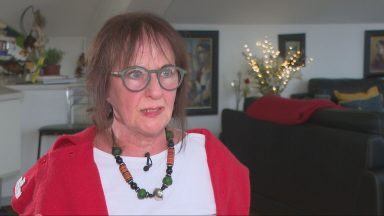A man was diagnosed with cancer after his optometrist added a test which is not generally administered as part of eye exams.
Michael Hughes, 65, from Stranraer, was offered an optical coherence tomography (OCT) scan during a routine eye examination.
The test, which allows optometrists to look deeper into the eyes than ever before, highlighted that something was off.
Optometrist Elaine Hawthorn noticed a small curve in the back of his eye, and referred him to hospital – where he was eventually diagnosed with malignant melanoma, or cancer in his eye.
After undergoing 100 hours of radiotherapy to treat it, Michael is now cancer free and “so thankful” to Elaine.
“I didn’t experience any symptoms and would have had no idea I had cancer if she hadn’t spotted that something wasn’t right,” he said.
Elaine said: “Michael had no symptoms of malignant melanoma, which is often the case.
“His story demonstrates that eye examinations can detect a wide range of health conditions and new technology like OCT is helping to flag potential problems at an early stage.”
OCT scans are not included as part of an NHS eye examination, however Optometry Scotland is now calling for the new technology to be included, ensuring it is available to all who may benefit from it.
It follows concerns the Covid-19 pandemic may have led to a rise in “preventable sight loss” in people continuing to postpone regular eye tests.
Optometry Scotland and national sight loss charity RNIB Scotland have joined forces for National Eye Health Week to highlight the importance of going for regular eye examinations, which are free for everyone in Scotland.
“Regular eye examinations don’t just indicate changes in our glasses prescription but can also help to detect eye health conditions such as glaucoma and other health issues including strokes and, in rare cases, even brain tumours,” said Julie Mosgrove, chair of Optometry Scotland.
RNIB Scotland director, James Adams, said: “Surveys show that sight is the sense people fear losing most. Yet we can be surprisingly complacent about it.
“Eye examinations can not only detect early signs of sight problems, possibly in time to arrest or reverse damage, but also sometimes pick up the symptoms of other conditions, such as high blood pressure and diabetes.
“During National Eye Health Week, we want to remind everyone to take care of one of the most precious things we have – our sight.”
For people with progressive sight loss, optometry practices can now directly refer them to RNIB Scotland’s eye care liaison officer service – which provides both practical and emotional support.
Follow STV News on WhatsApp
Scan the QR code on your mobile device for all the latest news from around the country


 iStock
iStock
























